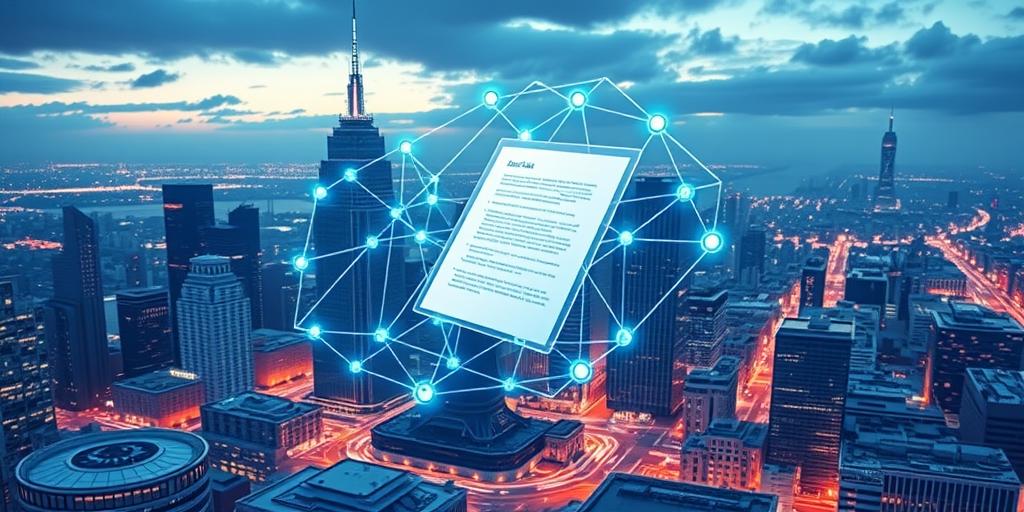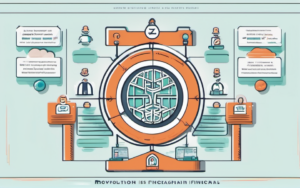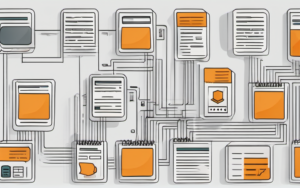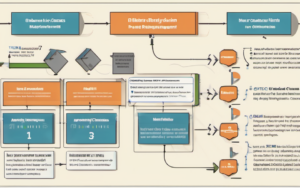Blockchain technology is rapidly transforming numerous industries, and its impact on the legal sector is particularly profound. The inherent security, transparency, and efficiency offered by blockchain are revolutionizing how legal professionals manage contracts, handle intellectual property, and resolve disputes. This post explores the multifaceted ways blockchain technology is reshaping the legal landscape.
1. Introduction
1.1 The Rise of Blockchain Technology
Blockchain technology, initially known for its role in cryptocurrencies like Bitcoin, is far more than just a digital ledger. Its decentralized, immutable nature makes it uniquely suitable for applications requiring high levels of security and trust. This distributed ledger technology (DLT) records transactions across multiple computers, making it virtually impossible to alter or delete data once it’s recorded. The technology’s growing sophistication and adaptability are continuously expanding its potential applications across diverse sectors.
1.2 Blockchain’s Impact on Various Sectors
The impact of blockchain extends beyond finance. Industries like supply chain management, healthcare, and voting systems are already leveraging its transformative potential. For instance, in supply chain management, blockchain enhances transparency and traceability, combating counterfeiting and improving efficiency. In healthcare, it facilitates secure data sharing and patient record management. The common thread across these sectors is the need for secure, transparent, and verifiable records.
1.3 Focus: The Legal Profession
The legal profession, with its reliance on accurate documentation, secure record-keeping, and efficient dispute resolution, is ripe for disruption by blockchain technology. The potential to improve contract management, enhance intellectual property protection, and streamline dispute resolution processes is significant. This post will delve into specific examples of how blockchain technology is reshaping various aspects of the legal industry.
2. Enhanced Security and Transparency in Legal Processes
2.1 Secure Data Management and Storage
Blockchain offers a highly secure method for storing and managing legal documents. Sensitive data, such as contracts, wills, and intellectual property agreements, can be stored on a distributed ledger, protected from unauthorized access or alteration. This significantly reduces the risk of data breaches and ensures the integrity of legal records. This improved data security is crucial for maintaining client confidentiality and complying with data protection regulations. For legal professionals, this means a more robust and reliable system for managing sensitive information.
2.2 Tamper-Proof Records and Audits
The immutable nature of blockchain makes it ideal for creating tamper-proof records. Once a document is added to the blockchain, it cannot be altered or deleted, providing a verifiable audit trail. This significantly reduces the risk of disputes arising from altered or missing documentation. This enhanced level of accountability ensures transparency and builds trust among all parties involved in a legal process, streamlining audits and investigations. The ability to easily track changes and verify authenticity is a game-changer for legal compliance.
2.3 Improved Transparency and Traceability
Blockchain enhances transparency by providing a shared, immutable record of all transactions and events. All parties involved can access and verify the information, improving accountability and reducing the potential for disputes. This traceability is particularly useful in complex legal cases involving multiple parties and documents. This eliminates the need for multiple verification processes and reduces potential delays.
3. Streamlining Legal Processes with Smart Contracts
3.1 Automating Contract Execution
Smart contracts, self-executing contracts with the terms of the agreement directly written into code, are a significant application of blockchain technology in law. They automate various aspects of contract execution, reducing manual intervention and potential errors. This automation streamlines the process significantly, saving time and resources for all involved parties. How blockchain improves legal contract management is a crucial aspect of this transformation.
3.2 Reducing Delays and Costs
By automating contract execution, smart contracts significantly reduce delays associated with traditional contract management. The automated processes minimize human intervention, leading to faster contract completion and reduced administrative costs. This efficiency translates to cost savings for both legal professionals and their clients. This is especially beneficial for high-volume contract processing.
3.3 Ensuring Compliance and Enforcement
Smart contracts automatically enforce the terms of the agreement, ensuring compliance. This reduces the risk of disputes arising from non-compliance and simplifies enforcement mechanisms. The automatic execution of contractual obligations minimizes the need for costly litigation. This automated compliance is a significant advantage in areas where regulatory compliance is paramount, such as financial transactions.
4. Blockchain’s Role in Intellectual Property Rights Management
4.1 Protecting Digital Assets
Blockchain technology offers a robust solution for protecting digital assets, such as software code, designs, and creative works. By recording ownership and usage rights on the blockchain, it creates a verifiable record of ownership that is difficult to dispute. This enhanced protection is crucial in the digital age where intellectual property rights are increasingly important.
4.2 Establishing Clear Ownership
The immutable nature of blockchain provides a clear and unambiguous record of ownership for digital assets. This eliminates disputes arising from unclear ownership claims and strengthens intellectual property rights. This significantly reduces the need for expensive and time-consuming litigation, offering a cost-effective solution for protecting creative works.
4.3 Facilitating Licensing and Transfer
Blockchain can streamline the licensing and transfer of intellectual property rights. Smart contracts can automate the licensing process, reducing administrative overhead and ensuring compliance with licensing agreements. This provides a more efficient and secure mechanism for managing intellectual property rights in the digital age. The benefits of using blockchain in legal tech are particularly evident in this area.
5. Decentralized Dispute Resolution Mechanisms
5.1 Alternative Dispute Resolution (ADR) Platforms
Blockchain can facilitate the creation of decentralized ADR platforms. These platforms offer a secure and transparent environment for resolving disputes outside of traditional court systems. This provides a more efficient and cost-effective alternative to traditional litigation. The use of blockchain in ADR platforms can potentially reduce the burden on traditional court systems.
5.2 Blockchain-Based Arbitration
Blockchain can be used to create secure and transparent arbitration processes. The use of smart contracts can automate certain aspects of arbitration, reducing delays and costs. This offers a more efficient and accessible method of resolving disputes. Such blockchain solutions for legal compliance are gaining traction.
5.3 Enhanced Efficiency and Accessibility
Blockchain-based dispute resolution mechanisms offer increased efficiency and accessibility. They can reduce the time and cost associated with resolving disputes, making it easier and more affordable for individuals and businesses to access justice. This enhanced accessibility is crucial for ensuring fair and equitable dispute resolution.
6. Challenges and Considerations in Blockchain Adoption
6.1 Regulatory Uncertainty and Legal Frameworks
The lack of clear regulatory frameworks for blockchain technology presents a significant challenge to its widespread adoption in the legal sector. The uncertainty surrounding legal enforceability and data privacy regulations can hinder investment and innovation. Addressing these regulatory uncertainties is crucial for fostering the growth of blockchain in the legal field. This includes establishing clear legal frameworks that address the unique aspects of blockchain technology.
6.2 Scalability and Interoperability Issues
Scalability and interoperability remain challenges for blockchain technology. The ability to handle large volumes of transactions and integrate with existing legal systems is crucial for its widespread adoption. These technological challenges need to be addressed to ensure seamless integration with existing legal infrastructure. Overcoming these hurdles is crucial for widespread adoption.
6.3 Data Privacy and Security Concerns
While blockchain technology offers enhanced security, it is crucial to address data privacy concerns. Appropriate measures must be implemented to ensure compliance with data protection regulations. Addressing these concerns is vital for building trust and ensuring the responsible use of blockchain in the legal profession. The challenges of implementing blockchain in law firms often revolve around these privacy and security concerns.
7. The Future of Law and Blockchain Technology
7.1 Emerging Applications and Use Cases
The applications of blockchain technology in the legal sector are constantly evolving. Emerging use cases include secure digital identity management, improved evidence management, and enhanced cross-border legal transactions. The potential for innovation is vast, with new applications emerging regularly. The future holds exciting possibilities for leveraging blockchain’s potential.
7.2 The Evolving Legal Landscape
Blockchain technology is fundamentally altering the legal landscape. It is driving increased efficiency, transparency, and security in legal processes. This transformation is reshaping how legal professionals work and interact with their clients. Law firms are already beginning to adopt blockchain technology to improve their operations and provide better services to their clients. The legal industry must adapt to these changes to remain competitive.
7.3 Predictions and Opportunities
The adoption of blockchain technology in the legal sector is expected to accelerate in the coming years. This will create new opportunities for legal professionals who embrace this technology. Law firms that invest in blockchain solutions will gain a competitive edge, offering more efficient and secure services to their clients. The possibilities are significant, and early adoption will be key for gaining a competitive advantage.
The integration of blockchain technology into the legal profession is not just a matter of adopting a new technology; it’s about fundamentally transforming how legal services are delivered and how justice is served. Legal professionals who actively engage with and understand blockchain technology will be better positioned to navigate the evolving legal landscape and provide innovative, efficient, and secure legal services in the future. The opportunities presented by blockchain are significant, and proactive adoption is key to unlocking its full potential.




